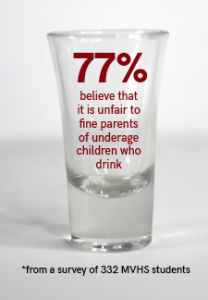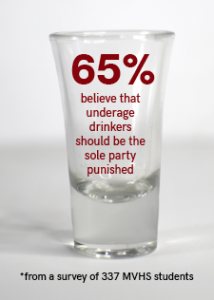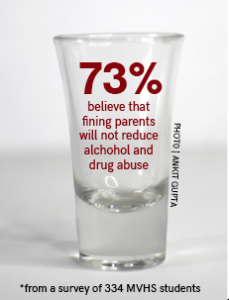Corking the bottle: discussing the new Cupertino social host ordinance

April 11, 2018
The Cupertino City Council voted unanimously on March 6 to approve the first draft of the social host ordinance, a new law that strives to reduce the amount of underage drinking and drug use in the city by increasing the consequences for the adults that the city deems responsible.
The social host ordinance was spearheaded by the Cupertino teen commission, nine middle and high school students from Cupertino who are responsible for representing the city’s teenagers, according to MVHS junior Siddarth Rajaram, chair of the teen commission. Former Cupertino mayor Savita Vaidhyanathan approached the teen commission and brought to their attention that Cupertino was one of the few cities in Santa Clara County without a social host ordinance.
“We all knew that underage drinking was a problem,” Rajaram said. “We did a lot of research on how other cities conduct punishments. I think our city, Campbell and Mountain View are the only cities in the area without a social ordinance. That’s a very alarming sign, so when we saw that, we were inspired to take action.”

Prior to the implementation of the social host ordinance, there were already punishments in place for teenagers caught engaging in underage drinking or drug abuse in Cupertino. Teens would be sentenced to community service, with the number of hours depending on their record and severity of the breach, and would also be required to take a state-mandated course on alcohol and drug abuse. The social host ordinance not only increases the hours of community service, but also fines the guardians of the teens $500 to $1,000.
Sophomore Varsha Subramanyam, a member of the teen commission, believes the parents are ultimately responsible for drug and alcohol abuse by teenagers. She feels holding them accountable for their children’s actions is important.
“We wanted to fine the adult or parent, even if they weren’t there at the time,” Subramanyam said. “We wanted to recognize that it is their fault for letting their kids get whatever controlled substance they had and bringing it to their house.”
According to Subramanyam, the goal of the fine is to make parents aware of their role in the actions of their children, making them more cautious while also pressuring teens to act responsibly so their parents don’t have to pay for their mistakes.
“With the passing of this law, we’re hoping that parents will be more cautious and keep alcohol away from children,” Subramanyam said. “We’re hoping that cautiousness will transfer to the teens too, so they’ll be more careful because they don’t want their parents to have to pay large fines.”
According to Rajaram, there is a viable argument for both sides on which party is responsible for underage drinking and drug use. In a survey of 399 MVHS students, 54 percent believe the underage drinker is at fault, and 40 percent think both parents and teenagers are at fault. Rajaram believes implementing punishments to combat the issue, not pointing blame to a specific party, should be the goal.
“There’s no distinct civil code for what to do if there’s a party and the parents aren’t there. There’s no distinct code for who’s responsible in that situation,” Rajaram said. “You could say, ‘It’s the parent’s fault for not being there.’ You can also argue that the kid is responsible. What the ordinance does is that it adds a punishment for both.”

English teacher Lynn Rose is a parent to teenage children, and believes that a fine for underage drinking is beneficial to the community, as the fine may be able to prevent the dangerous situations that underage drinking causes.
“I feel like any additional deterrent is a good thing,” Rose said. “A fine is really nothing compared to the dangers that could happen. To be able to have that deterrent and stop those things from happening seems to me to be reasonable because it makes it harder for kids to find the opportunity to drink.”
However, not everyone believes that parents should be held responsible and punished for their kids’ choices, made without their knowledge or consent. John, an anonymous MVHS student who participates in underage drinking, thinks fining parents is unfair, as underage drinking is ultimately the teen’s choice.
“I don’t think [the ordinance] is a good idea. Parents should be able to raise their kids with their own beliefs,” John said. “I feel like while they are in charge of us, there’s only a certain amount of power [they have]. They can’t watch us at all times, so the stuff that we do they have no power or control over.”
While John thinks that the social host ordinance will be ineffective, Subramanyam strongly believes in its potential to change teenage behavior. According to her, the ordinance’s power doesn’t originate from the actual fine, but from the severity and symbolic nature of the punishment. She explains that most Cupertino residents wouldn’t be financially challenged due to the fine, but would still take being fined by the police seriously.
“I think that in this area, obviously, money isn’t as much of a problem,” Subramanyam said. “Up until now, parents wouldn’t have to pay the consequences, so they wouldn’t be as related to [the issue]. With this law, the parents will be more involved and I don’t think that any kid wants their parents [involved] in their personal lives to that point.”
 John predicts that the fine will do little to change the actions of teenage drinkers. He doesn’t think that harsher punishments will inspire teens to act responsibly.
John predicts that the fine will do little to change the actions of teenage drinkers. He doesn’t think that harsher punishments will inspire teens to act responsibly.
“I don’t feel like putting a money value on it is something that would promote [not drinking underage],” John said. “Because at the end of the day, you already did it, so what is paying $500 after going to do [to change anything].”
Rajamaran accepts that the ordinance may prove inefficient at preventing underage drinking. In this case, Rajaram says the teen commission might alter the ordinance to fit the city’s needs. He emphasizes that it is going through a trial period, in which the Cupertino Council will observe the productivity of the social host ordinance.
“This is our pilot so we’ll have to see what happens and if it’s easy for the police to enforce it,” Rajaram said. “Based on that, we can change the punishments — either increase them or decrease them.”
While John doesn’t believe the consequences will be effective, he acknowledges that these types of laws exist to keep people who drink rashly and irresponsibly safe. He understands that the law is only meant to protect him.
“I think that laws are put in place for our safety, and when I do [drink], I make sure I’m safe,” John said. “So I’ll never drink and drive and I’ll make sure I have a ride home. When you [drink] like that I think it’s fine, but I think the laws are more to protect us for our safety. Because there are people, on New Year’s, for example, [that] will drink and drive. I think punishing those people isn’t a bad thing.”
However, English teacher Kate Evard, a mother to children aged 18 and 20, believes that underage drinking is incredibly dangerous, and if her children participated in it, she would view the fine as a fair punishment for their actions.
“I think the message has to be very clear that we cannot put our kids in danger. That cannot be overemphasized,” Evard said. “It’s still my house. They’re my children. I think that I should be held responsible. I mean, somebody has to be.”
Subramanyam understands that teenagers who engage in underage drinking may be resistant to the ordinance, as it increases the repercussions. However, she believes people are naturally opposed to change, not thinking of long-term benefits, and that without change, improvement and prgression aren’t possible.
“Any law that changes your day-to-day life, obviously you’re going to have a negative reaction, because it’s a change,” Subramanyam said. “But change is necessary, especially because people don’t usually associate the Bay Area and Cupertino with heavy party culture [even though] it definitely does exist. Teens are probably not going to like it but I think that it’s a needed change.”


















